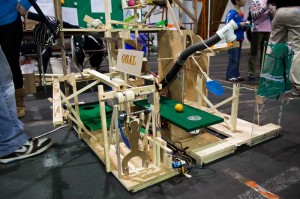
Rube Goldberg Innovation
Axiomatic to Compression Thinking is that the world is finite; therefore for all practical purposes, all resources in it are finite. Almost all other thinking is up for grabs.
Therefore we must deal with the consequences of the depletion of all kinds of natural resources, not just energy and water, plus deal with the consequences of dispersing huge amounts of concentrated resources into our environment, disturbing its balance.
In such a world, what is innovation? Let’s say that it is the ability to adapt to rapid change using far fewer virgin resources. Sustaining the ecosystem while also sustaining quality of life calls for unprecedented ingenuity. But to know whether innovations are beneficial, we need huge changes in human “paradigms.” That is more difficult. Technically, a great deal is happening. Technically we know a general direction in which to go, but we have great difficulty seeing an integrated picture and taking mutually supportive action.
That is, our biggest threat is us – our own capacity to learn and to change. We prefer the “first law of wing walking:” Don’t let go of anything until you have a firm grip on something else. Past paradigms retain a mental and emotional grip on us that is hard to break.
Our deeper levels of innovation lie within us. Can we cultivate the capacity to solve new and often unanticipated problems – react well. The deepest level of innovation is learning to anticipate well – learning to innovate by criteria of success that are the opposite of racing to see who can die in possession of the most toys. That is quality over quantity always, or learning to do the right thing, as best we know, rather than doing what we have always done, but a little bit better.
By contrast, a commercial view of innovation is that success is developing something that captures a market, or that creates a new market. That’s a transactional view of the world; that innovative success should translate into business profitability; maybe even into Gates-like wealth. However, a good many would be entrepreneurs like Nikola Tesla have pioneered new ideas without enjoying commercial success. A later entrant finished the innovation and reaped the monetary rewards. Creative destruction can be a cruel process.
To deal with the problems of Compression within a generation or so implies shifting human thinking and beliefs at a breakneck pace compared with our historical rates of change, culturally as well as intellectually. We have to leave our old comfort zones and reach for more integrative feats of human accomplishment – integrative in the sense of being in balance with earth as it really it. That is our biggest innovative challenge.
